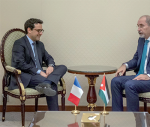You are here
A setback for Iran
Apr 20,2015 - Last updated at Apr 20,2015
It is not as if the international community were oblivious to the negative and destructive role being played by Iran and its proxies in Yemen.
And yet, it seems that the Arab countries have to take action to draw the attention of the world to the consequences of leaving Iran unchecked.
Things took a different turn when Saudi Arabia changed its posture in the face of rising challenges and Iran’s subversive tactics in the region.
As a result of the Saudi Arabia-led three-week-long sustained military and diplomatic campaign to check Iran’s allies in Yemen, the international community finally came to the realisation that it should help rein in Iran’s proxies.
The Arab Gulf countries helped draft UN Security Council Resolution 2216, which called for the imposition of an arms embargo on Iranian-backed Houthis.
The resolution bans the sale of weapons to the Houthi group, as well as to former Yemeni president Ali Abdullah Saleh, who has been accused of sabotaging the political process in Yemen.
The resolution was passed; were it not for Russia, it would have passed unanimously.
Of course, Iran is the loser following the UN Security Council’s passing the resolution. Its attempt to buy time did not work this time.
For sure, Iran is widely seen as part of the problem and therefore the international community ignored Iran’s tricky ideas for a peaceful settlement to the conflict in Yemen.
The problem is not the idea of a peaceful resolution of the conflict, but the fact that Iran and its proxies are hardly trustworthy.
They only floated the idea of an immediate ceasefire after they suffered military setbacks on all fronts in Yemen.
The resolution does not call for a ceasefire, as Iran has suggested, and this is very important. In fact, the Houthis and Iran talked about peaceful settlement for the first time only after the Arab coalition inflicted a severe blow to them in Yemen.
A ceasefire would only mean that the Houthis will group again and that Iran will find ways of providing them with necessary weapons to consolidate whatever gains left for them.
It is for this reason that the Gulf countries opposed Russia’s desire to include a ceasefire in the provisions of the resolution.
Many pundits would argue that Iran is surprised by the decisiveness on the part of the Arab countries.
Tehran sought to exploit the weakened Arab world in the wake of the Arab Spring to establish a foothold everywhere possible.
The tumultuous regional environment offers Iran the opportunity to expand.
Obviously, Iranian politicians do not really care about the Yemeni people. Their interference in Yemen fits neatly in Tehran’s strategy to transform Yemen into a sphere of influence, as it did with Lebanon, Syria and Iraq.
But the Saudi military and diplomatic success has left Iranian leaders stunned.
Among other things, the Security Council resolution blacklists Saleh’s son as well as some top Houthi leaders, chief among them Abdel Malek Al Houthi.
Saleh undermined the political process that would have generated a different and more inclusive political game.
Since the eruption of the current wave of violence, forces loyal to Saleh have been fighting alongside Houthis.
The decisiveness of the Gulf countries showed Saleh that there is a huge price tag for his subversive role in Yemen.
Rather than trying to mitigate the unfolding crisis, Saleh aggravated it for his own political ends.
The lesson that the Arab regimes should learn is that diplomatic successes come only after they have power and convey to both friends and foes the fact that they are willing to use this power if necessary.













